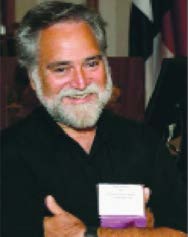I think readers of this magazine would nominate two words that would give “cellar door,” and “tremulous,” a run for their money. They certainly convey “comfort and the deepness of human relationships.” They are “exceptional” and “parent.”

Not sure how many I used since I woke up this morning; but I just used 19 of them. I know because I counted them. That is one thing you can do with words. They can be counted and, in fact, when you are writing an article or a column, you almost have to count them. There are just so many you can put on a page. For years we have been instructed to count our words. I remember entering contests, “In 25 words or less, tell Roy why you want to win the pony.” I remember (in a grant application review) to describe in 200 words, “how would you trace the source of the contradictory findings by using a complex design in which both the original independent variable and the independent variable that is presumed to be responsible for the discrepant findings are manipulated in the same experiment.” I imagine they are still waiting for my response. I understand that on some online dating sites they require you, in 50 words or less, to describe your spiritual-emotionalintellectual aspirations as they relate to finding a life-long companion, including your preference for long or short walks on a tropical beach in search of Clypeasteroida specimens. I hate the software that restricts the number of words you can use in a “response field” that includes a “count down indicator.” It’s as if you are defusing a bomb and the digital counter reminds you that you only have six seconds before it blows up. It’s cruel to know you only have 13 words left to summarize your justification for implementing an “intergenerational model of inclusion.” According to Johnny Ling,
“The number of words in English has grown from 50,000 to 60,000 words in Old English to about a million today. An average educated person knows about 20,000 words and uses about 2,000 words in a week.” So what do the world’s most celebrated “wordsmiths” “words?”
“Words can be like X-rays if you use them properly – they’ll go through anything. You read and you’re pierced.” Written by a guy, Aldous Huxley (Brave New World) who knew a thing about X-rays and depicted life seven centuries after the twenthth century. “She had always wanted words, she loved them; grew up on them. Words gave her clarity, brought reason, shape.” Famous for his novel, The English Patient, Michael Ondaatje describes clarity, reason and shape as the three vehicles words can provide.
Women, mused, “I like good strong words that mean something.” Roald Dahl, the British novelist and fighter pilot, referred to as “one of the greatest storytellers for children of the 20th century,” gets my vote for cutting to the chase with, “Don’t gobblefunk around with words.” Clever, since “gobblefunk” is a word that says it all (the ultimate goal of any word).
The British Council, two words that conjure up images of stuffy aristocrats with the titles of Lord, Sir, Duke and Viscount is a British organization specializing in the spread of the use and adoption of the English language. In a smoke-filled, wood paneled study with overstuffed leather chairs, they came up with a challenge. They posed the question, “What is the most beautiful word in the English language?” They surveyed more than 7,000 English speakers in 46 countries and came away with a confusing array of nominations. Confusing is the key “word,” because the concept of a “beautiful word” has two sets of plausibility. There was the usual collection of “beautiful words;” words that had their roots in the “beauty” of the thing the word conveyed. So it was no surprise to find “liberty,” “tranquility,” and “smile.” These reflected beautiful concepts, expressions or visions. Who could argue with any of those three words being beautiful? But like all things, that’s too “easy” (another candidate for a beautiful word). Neuroscience enters the picture and “easy” gets placed on the “pile” (a word that has never been considered beautiful). Seems there is something called “phonoaesthetics,” the science that studies both sound and phonology and how it influences our appreciation of what is beautiful or, more precisely, what “sounds” beauti-